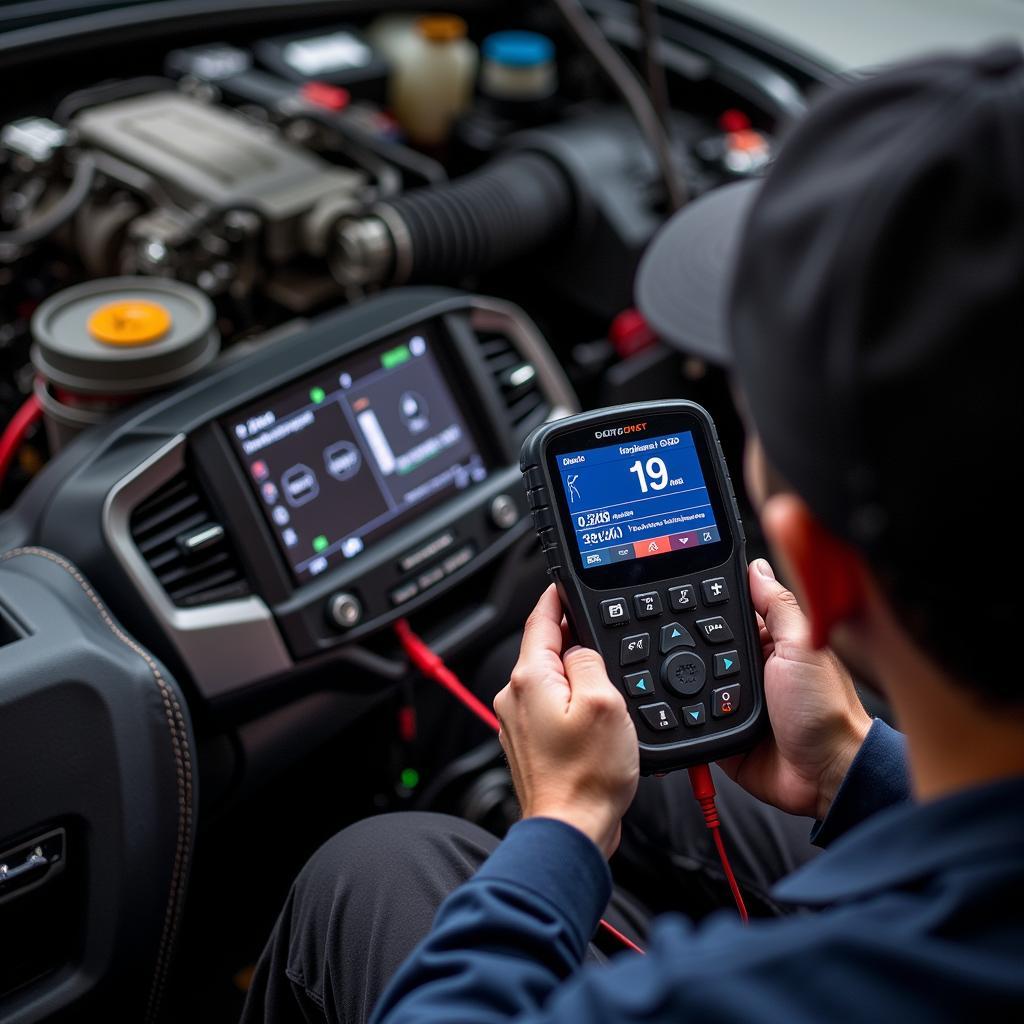A failing alternator can leave you stranded. But can a car diagnostic tool actually detect a bad alternator? The answer is, sometimes. While a diagnostic tool can be extremely helpful, it’s not always a foolproof method. Let’s explore how these tools work, what they can tell you about your alternator, and when you might need more than just a scan. After reading this article from DiagFixPro, you will understand how diagnostic tools work with alternators and other car components.
How Car Diagnostic Tools Work With Alternators
Car diagnostic tools, also known as OBD-II scanners, plug into your car’s computer system and read diagnostic trouble codes (DTCs). These codes are like clues, pointing to potential issues within various systems, including the charging system which the alternator is a key part of. A car battery diagnostic tool can sometimes reveal issues with the battery itself, which may be mistakenly attributed to a bad alternator.
Sometimes, a failing alternator will trigger a DTC related to low voltage or charging system malfunction. This is a clear indication that something is amiss. However, not all alternator problems result in a DTC. For example, a worn-out brush or a failing diode inside the alternator might not trigger a code, even though they’re causing the alternator to underperform.
What a Diagnostic Tool CAN Tell You
A diagnostic tool can provide valuable information about your car’s charging system, even if it doesn’t directly pinpoint a bad alternator. It can display live data, such as:
- Battery Voltage: This shows the current voltage of your battery. A low voltage reading could indicate a failing alternator, especially if the voltage drops further when accessories are turned on.
- Charging System Voltage: This reveals the voltage the alternator is producing. If it’s significantly lower than expected, it suggests a problem with the alternator.
- DTCs Related to Charging System: As mentioned earlier, these codes provide clues to potential problems within the charging system. These are a great starting point for a car diagnostic alternator check.
 Car Diagnostic Tool Detecting Bad Alternator
Car Diagnostic Tool Detecting Bad Alternator
When a Diagnostic Tool Isn’t Enough
While a diagnostic tool is a great starting point, it’s often only the first step. Here are situations where further testing is crucial:
- No DTCs but Symptoms Persist: If you’re experiencing symptoms like dimming headlights, flickering interior lights, or a slow engine crank, but the diagnostic tool shows no codes, a bad alternator could still be the culprit.
- Intermittent Problems: Alternator issues can be intermittent, meaning they come and go. A diagnostic tool might not catch these issues if the alternator is functioning normally at the time of the scan.
- Need to Confirm Diagnostic Findings: Even if you get a DTC related to the charging system, it’s always a good idea to perform further tests to confirm the diagnosis before replacing the alternator.
“A diagnostic tool is a great tool, but it’s not a replacement for a proper diagnosis. Always consider the symptoms and perform additional tests to confirm the problem,” says John Miller, ASE Certified Master Technician.
Other Tests for Diagnosing a Bad Alternator
Several other tests can be performed to pinpoint a bad alternator:
- Battery Test: A weak or failing battery can mimic the symptoms of a bad alternator. Testing the battery ensures that it’s not the source of the problem.
- Alternator Output Test: This test directly measures the alternator’s output voltage and current. It can pinpoint whether the alternator is producing enough power.
- Voltage Drop Test: This test checks for excessive voltage drop between the alternator and the battery, indicating a problem with the wiring or connections.
 Mechanic Performing Alternator Output Test
Mechanic Performing Alternator Output Test
Why a Diagnostic for Car Computer Can Be Misleading
Sometimes, issues with the car’s computer system can be misinterpreted as alternator problems. For instance, a faulty sensor or a problem with the engine control module (ECM) might affect the charging system’s performance. That’s why it’s crucial to thoroughly diagnose all potential causes before replacing any parts.
“Don’t just throw parts at the problem. A systematic approach is essential for accurate diagnostics and cost-effective repairs,” advises Maria Sanchez, Electrical Systems Specialist.
Conclusion: Can a Car Diagnostic Tool Detect a Bad Alternator?
So, can a car diagnostic tool detect a bad alternator? While it can provide valuable information and sometimes point directly to the alternator, it’s not always definitive. Using a diagnostic tool in conjunction with other tests and a thorough understanding of the charging system is the best way to ensure an accurate diagnosis and prevent unnecessary repairs. A failing alternator should never be ignored. Addressing the issue quickly can save you from a breakdown and costly repairs down the road.
FAQ
-
Q: Can a low battery cause an alternator to fail?
- A: A consistently low battery can put extra strain on the alternator, potentially shortening its lifespan.
-
Q: How long do alternators typically last?
- A: Alternators usually last between 7 and 10 years, but this can vary depending on usage and driving conditions.
-
Q: What are the signs of a failing alternator?
- A: Common signs include dimming headlights, flickering interior lights, a dead battery, and a whining noise coming from the engine.
-
Q: Can I drive with a bad alternator?
- A: You can drive for a short distance with a bad alternator, but your battery will eventually drain, leaving you stranded.
-
Q: How much does it cost to replace an alternator?
- A: The cost of alternator replacement varies depending on the make and model of your car, but it typically ranges from $300 to $800.
-
Q: Can I test an alternator myself?
- A: Yes, you can perform basic tests like the battery voltage test and the alternator output test with a multimeter.
Further Reading
For more information on car diagnostics, check out these articles on our website:
- How to choose the right car diagnostic tool
- Understanding diagnostic trouble codes
- Common car battery problems and solutions
Need assistance? Contact us via WhatsApp: +1(641)206-8880, Email: [email protected] or visit us at 910 Cedar Lane, Chicago, IL 60605, USA. Our customer service team is available 24/7.

Leave a Reply